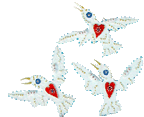CHOOSE AN ARTIST
FROM THE LIST
Johnny Ace, an American Genius
by Terry Hammons, Ph.D.
I met Johnny Ace twenty years ago when I caught him stealing the battery from my car. Suffice to say that we developed a friendship based on our mutual interest in American pop culture in general and popular music in particular. I've watched his work evolve and I've come to know him as well as anyone can.
Often inarticulate and always paranoid, Ace reveals little about his personal history. This much is known. He was born in the early 1930s in east Texas. There was trouble as a boy and he took to the road. At some point he picked up the rudiments of the guitar and harmonica. That and petty theft kept him afloat.
In 1954, Ace was released from prison in Oklahoma and migrated to St. Louis to resume his life as a pick-up player. That brought him into the emerging rock 'n' roll business. For the next decade he was consistently at its fringe. It is said that he did the cover art for Duane Eddy's first album and played harmonica on Bruce Chanel's early sixties hit, “Hey, Baby”. He worked with Little Richard, Larry Williams and The Del Vikings, although often only as a roadie.
There was more time in prison, four years in the mid-sixties and two in New York in the 1970s. Ace was disfigured in a riot at Attica and has been reclusive since then. Rumors swept the art world years later that Ace lost both hands in that riot and painted with the brush between his teeth. The rumor was debunked when it was traced to Ace himself. On the positive side, he took part in an art-based rehab program for recovering addicts while at Attica and began seriously developing his interest in the visual arts.
His first boards appeared around the South in the 1970s. Critics quickly noted the strong colors and his work's precision. (Ace attributes his sense of color to a period when he hid among Rastafarians in Jamaica in the late 1960s. His precision is inexplicable - it is at odds with every other mental habit Ace has ever evidenced.) For the next decade he wandered the South, producing art now and then and playing guitar in roadhouses. He claims to have toured with The Sex Pistols and produced several rap albums during that time. In 1990, he settled in Atlanta to be near several of his illegitimate children.
Ace is recognized as America's foremost photo surrealist, a genre he invented. He inhabits a universe somewhere between folk and pop art - much like The Lovin' Spoonful or The Mamas & The Papas, as Ace puts it. That ambiguity and the difficulty of matching his work with most sofas have kept his sales limited to a small but growing cult.
Ace's technique is unusual, but sophomoric. He conceives a picture, decoupages the photos on a board and proceeds as if it were a coloring book. Everything but flesh gets painted and laminated with multiple coats of polyurethane, an effect that creates what one critic called "a Coney Island on acid" sense. As Ace says, "any fool can do it". In short, it is Ace's message, not the medium, that invites serious interest.
Ace, almost alone, makes pop culture from pop culture to comment on pop culture. He loves its cheesy disposability and arrogant imbecility. He loves its humor and its hubris and makes it the point of his work. He reminds us that pop culture is an ephemeral joke, a diversion from the existential nausea that is our natural fate.
Ace's Elvis boards are the best explication of that belief. He stands mute before the Elvis cult that, at once, deifies and makes a cartoon of Elvis. Ace's Elvis is nuanced. He has dreams and insecurities. Sometimes he is shrewd and sometimes a buffoon. Ace's Elvis is, I believe, real. Ace's Elvis is the perpetually fame-stunted nineteen-year-old that surely was the man in actuality.
Johnny Ace's day is coming. He is an American Original, a unique talent the equal of Howard Finster or Roy Lichtenstein. (That's why Forbes magazine recently named him "the best investment in contemporary art in America.") As his friend, I only hope that his fame and fortune arrive in time for him to enjoy it and repay me all the money I've loaned him over the years.
-Terry Hammons, Ph.D.
The Critics Speak:
"This is what happens when democracy runs amok.
All standards go by the boards and the dreams of opium eaters constitute 'art'."
Robert Hughes, The New York Times
"Women haven't been objectified like this since Ruebens. Johnny Ace is a pig."
Susan Sontag, Notes on Camp
"Gear. Fab. Johnny Ace is just like real rock 'n' roll. It's loud, dumb and mostly stolen from somebody else."
John Lennon
"Ace achieves the peculiar blending of word and image that characterizes a distinctly American contribution to modern art. Fortunately, his pieces also make excellent cheese boards."
Tom Wolfe, The Painted Word
"Ace's stuff is great. If I was alive, I'd buy it."
Jim Morrison
"Priscilla wants to sue him, but I like it. Thank you very much."
Elvis Presley
CHOOSE AN ARTIST
FROM THE LIST
Questions about an item or an artist?...ready to buy?...
